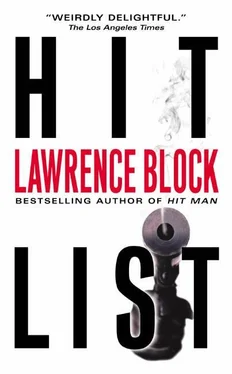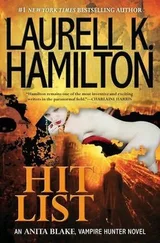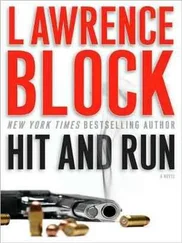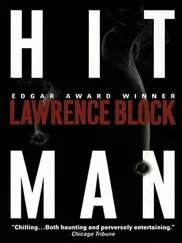“And you usually seem, oh, what’s the word I want? Triumphant? Not bursting into song necessarily, and maybe even a little reserved, but like you’re the cat bringing in the dead mouse. Pleased with yourself.”
“I’m pleased.”
“Any minute now you’re going to do handsprings. I can tell.”
“Well, it was complicated,” he said, “and it took a while. And when it was done I didn’t get to pack up and go home.”
“Nothing to pack. And you were already home. How’d you do it?”
“The subway.”
“Is that how you got out to Williamsburg? Oh, the subway’s how you did it.”
“An oncoming train.”
“And a body on the tracks. ‘Did he jump or was he pushed?’ You know what’s funny? So many times they want an accident, and it’s not always possible to stage it so it gets past forensics. But this guy wanted a big splash, and what you gave him is something that’ll go in the books as an accident.” She frowned. “Although when a whole subway train runs over you, ‘big splash’ is not an entirely inappropriate phrase.”
“The client won’t complain.”
“I don’t even care if he does,” she said, “because we’re not working for him again, or for anybody else in New York. So I’d just as soon he doesn’t ask us.”
“He won’t.”
She gave him a sharp look. “There’s something you’re trying to tell me,” she said, “and I have a horrible idea I know what it is. Am I right?”
“How do I know?”
“Keller, do I have to send the money back?”
“No.”
“And when can I expect the rest of it? I can’t, can I?”
“No.”
“Because the client’s had trouble writing checks ever since he took the A train.”
“It wasn’t the A train.”
“Keller, I don’t care if it was the Atchison, Topeka, and the Santa Fe.” She sighed heavily. “You might as well tell me all about it.”
Where to start? “I figured out who the client was.”
“And a good thing, too, or you wouldn’t have known who to kill.”
“It was the gallery owner,” he said, and explained how Niswander had changed allegiances. “Galleries get fifty percent of sales. Buell had worked hard and spent a lot of money building Niswander up, and now the guy was going with somebody else, and on top of that he was telling his friends and patrons not to buy anything from his last show with Buell. They should wait and spend their money with the new dealer.”
“So Buell was angry,” she said, “but angry enough to kill? And it’s not as if you work for minimum wage. He was throwing good money after bad.”
“What he was throwing was bread upon the waters. Do you know what happens when an artist dies?”
“They give him an enema,” she said, “and bury him in a matchbox.”
“His price goes up. They know he’s not going to flood the market with new pictures, and that he doesn’t have his best work ahead of him. So there’s a scramble for what he managed to complete before his death.”
“So every artist is worth more dead than alive?”
“No,” he said, “but Niswander is a rising star, just beginning to hit his stride. That’s why Buell was so upset at the prospect of losing him. And, if Niswander happened to be murdered in some dramatic fashion, that would give things a major boost.”
“But what would Buell get out of it? He was losing Niswander after the show, and didn’t you tell me everything in the show was already sold?”
He nodded. “Niswander told everybody not to buy. And Buell sold out the entire show overnight.”
“Got it. He sold them to himself.”
“Plastered the walls with red dots the minute his assistant went home for the night. Four hundred thousand dollars is what the prices added up to, but he would have only had to pay half of that to Niswander. And, if the artist happened to be dead, he could probably take his sweet time settling with the estate.”
“And if Mrs. Niswander got killed, too, he might never get called to account. No wonder he didn’t care how many mushrooms wound up in the omelet.”
“More publicity, too. Artist, Whole Family Slain in Brooklyn Rampage . More hype for the Niswander mystique.”
“And he’d be sitting on forty paintings, with the price set to go through the roof.” She frowned. “That’s a pretty extreme thing, killing off your own artists so you can make more money on them. I don’t know much about ethics in the gallery business, but I’d call that pretty low.”
“Most people would.”
“On the other hand,” she said, “did you happen to notice what kind of a house we’re in?”
“Victorian, isn’t it? I don’t know a whole lot about architecture.”
“I’m talking metaphorically, Keller, and that makes it a glass house, and what do you think we shouldn’t do?”
“Throw stones?”
“Especially at our own clients.”
“I know.”
“Because they tend to be moral lepers, but what the hell do you expect? Albert Schweitzer never hired a hit man, and neither did the guy in the loincloth, and-“
“The guy in the loincloth?”
“They made a movie about him. He was little and he talked funny and at the end he got shot. You know who I mean.”
“It sounds like Edward G. Robinson in Little Caesar, ” he said, “but are you sure he never hired a hit man? Because it seems to me-“
“Christ almighty,” she said. “Gandhi, all right? Mahatma Gandhi, from India. Okay?”
“Whatever you say.”
“Edward G. Robinson,” she said. “Edward G. Robinson in Little Caesar . When the hell did Edward G. Robinson ever wear a loincloth?”
“I was wondering about the loincloth.”
“Jesus, Keller. Where was I?”
“They never hired a hit man.”
“Schweitzer and Gandhi. Well, they never did. You don’t have to be a good human being to be a good client. All you have to do is play straight with us and pay what you owe. Which Regis Buell might or might not have done, but how will we ever know?”
“I really liked Niswander’s paintings, Dot.”
“Look, I’ll take your word for it he’s the real thing. What the hell, Buell must have thought so himself. That’s what made him worth killing.”
“It’s not just that he’s good. I responded to his work.”
“You wanted to hang him on your wall.”
“Dot, I wanted to climb right up into one of his trees and hide in the branches. A man who can paint something that does that to me, how can I kill him?”
“We could have resigned the account.”
“So? Then someone else does it.”
“At least the blood’s not on your hands.”
“The man’s just as dead. He’s not going to be painting any more trees. What do I care about blood on my hands?”
She was silent for a long moment. Then she said, “Look, what’s done is done, and I’m not even going to say you were wrong to do it. What do I know about right and wrong? I’m in the same glass house, Keller. I’m not going to be heaving boulders at you.”
“But?”
“But this isn’t the first time one of our clients purchased the agricultural real estate.”
“Huh? Oh, bought the farm.”
“ Acre by acre.”
“There was that cutie pie in Iowa, played games with us and tried to screw us out of the final payment.”
“And the one in Washington, had you convinced your orders came straight from the White House. Forget those two, Keller. They had it coming.”
“And one other time,” he admitted, “when two clowns each hired us to do the other. And he”-his eyes rose to the ceiling-“said yes to both jobs. What choice did I have? How could I do the job without tagging a client?”
“The way I remember it, you tagged them both.”
Читать дальше












